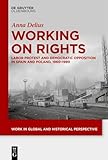Working on Rights : Labor Protest and Democratic Opposition in Spain and Poland, 1960–1990 / Anna Delius.
Material type: TextSeries: Work in Global and Historical Perspective ; 17Publisher: München ; Wien : De Gruyter Oldenbourg, [2023]Copyright date: ©2024Description: 1 online resource (XIII, 374 p.)Content type:
TextSeries: Work in Global and Historical Perspective ; 17Publisher: München ; Wien : De Gruyter Oldenbourg, [2023]Copyright date: ©2024Description: 1 online resource (XIII, 374 p.)Content type: - 9783110768855
- 9783110768947
- 9783110768916
- 322.20943809046 23/eng
- HD6763.5
- online - DeGruyter
- Issued also in print.
| Item type | Current library | Call number | URL | Status | Notes | Barcode | |
|---|---|---|---|---|---|---|---|
 eBook
eBook
|
Biblioteca "Angelicum" Pont. Univ. S.Tommaso d'Aquino Nuvola online | online - DeGruyter (Browse shelf(Opens below)) | Online access | Not for loan (Accesso limitato) | Accesso per gli utenti autorizzati / Access for authorized users | (dgr)9783110768916 |
Frontmatter -- Acknowledgements -- Contents -- List of Abbreviations -- 1 Introduction: On Democratic Labor Oppositions in Spain and Poland 1960–1990 -- 2 Emerging Oppositions – Citizens Starting to Organize -- 3 Illiberal Backlashes – State Reactions to Oppositional Dynamics -- 4 Conclusion – Working on Rights under Authoritarian Rule -- 5 Sources and Bibliography -- Index
restricted access online access with authorization star
http://purl.org/coar/access_right/c_16ec
This book is the first to connect global labor history and the history of human rights: By focusing on democratic labor oppositions in Spain and Poland between 1960 and 1990, it shows how workers in authoritarian regimes addressed repression and whether they developed a language of rights in the light of a globally dynamic human rights discourse. The study argues that the democratic labor oppositions in Spain and Poland were both variants of emancipatory and democracy-oriented social movements with global interconnections that emerged in the 1960s. It reveals that the demands for free and independent trade unions, which in both countries became a flashpoint in the fight for broader democratic demands, was not always discussed in rights terms, but rather presented as an inevitable necessity. At the same time, these labor movements and their intellectual allies morally delegitimized state repression against workers and thereby employed the concepts of democracy, participation, solidarity, progress and eventually, rights. Integrating the history of two European semi-peripheric societies into a broader narrative, this book is relevant for readers interested in global labor history, human rights history and the history of democratization in Europe in the late twentieth century.
Issued also in print.
Mode of access: Internet via World Wide Web.
In English.
Description based on online resource; title from PDF title page (publisher's Web site, viewed 06. Mrz 2024)


